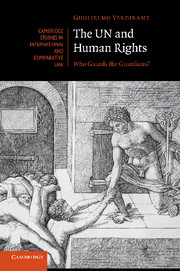Book contents
- Frontmatter
- Contents
- Foreword
- Acknowledgements
- Abbreviations
- Table of cases (international)
- Table of cases (national)
- Table of legal instruments
- Introduction
- 1 Concepts and definitions
- 2 Human rights obligations of international organisations
- 3 International institutional responsibility
- 4 UN relief and development operations
- 5 UN peacekeeping operations
- 6 International administrations
- 7 Implementation of UN sanctions
- 8 Accountability
- Conclusions
- Bibliography
- Index
- References
8 - Accountability
Published online by Cambridge University Press: 07 October 2011
- Frontmatter
- Contents
- Foreword
- Acknowledgements
- Abbreviations
- Table of cases (international)
- Table of cases (national)
- Table of legal instruments
- Introduction
- 1 Concepts and definitions
- 2 Human rights obligations of international organisations
- 3 International institutional responsibility
- 4 UN relief and development operations
- 5 UN peacekeeping operations
- 6 International administrations
- 7 Implementation of UN sanctions
- 8 Accountability
- Conclusions
- Bibliography
- Index
- References
Summary
Introduction
Until only a decade ago the question of the accountability of international organisations was confined almost exclusively to the realm of political and administrative remedies. Things have changed quite dramatically since then. Accountability through the judicial process is no longer a merely theoretical possibility, as the jurisprudence of national and of international human rights courts includes a growing number of cases related to the activities of international institutions. The curious thing is that such a development took place without a change in the fundamentals of the law of immunity. The prospects of bringing a successful lawsuit in a domestic court, where the UN is respondent, have not improved. But many of the activities of international organisations require implementation by member states, and this is where the potential for litigation has been shown to be the greatest: the public body responsible for the implementation is sued in a domestic court or the state in an international human rights court. As amply discussed throughout this book, this litigation faces difficulties, particularly in relation to issues of attribution and jurisdiction ratione personae. Nevertheless, claimants have succeeded in a number of important cases. The result is that, in order to minimise their exposure to these claims, states are more likely now than before to ensure that the activities of international organisations comply with human rights law.
This strategy has, however, one limit. States will have an interest in monitoring compliance by the UN with international human rights law only where they are faced with a risk of litigation – that is only where they have adopted measures which give effect to decisions or recommendations of international organisations and which could form the object of a claim. The main example in this area is sanctions, where, as we have seen in the previous chapter, claimants have maximised the exposure of states to litigation that derives from the activity of implementation. But where the conduct requires no implementation on the part of the state, the prospects of bringing a human rights claim that has, albeit indirectly, the conduct of an international organisation as its object remain minimal. The administration of refugee camps, examined in Chapter 6, is an example. Short of success – unlikely in the present state of the law – in defeating the plea of immunity that would be raised by the international organisation in a domestic court, or short of success – even more unlikely – in establishing jurisdiction ratione personae before an international human rights body, one more hopeful avenue open to claimants in these cases is to sue the public authorities, or the state, for breach of a positive obligation under human rights law.
- Type
- Chapter
- Information
- The UN and Human RightsWho Guards the Guardians?, pp. 320 - 393Publisher: Cambridge University PressPrint publication year: 2011



